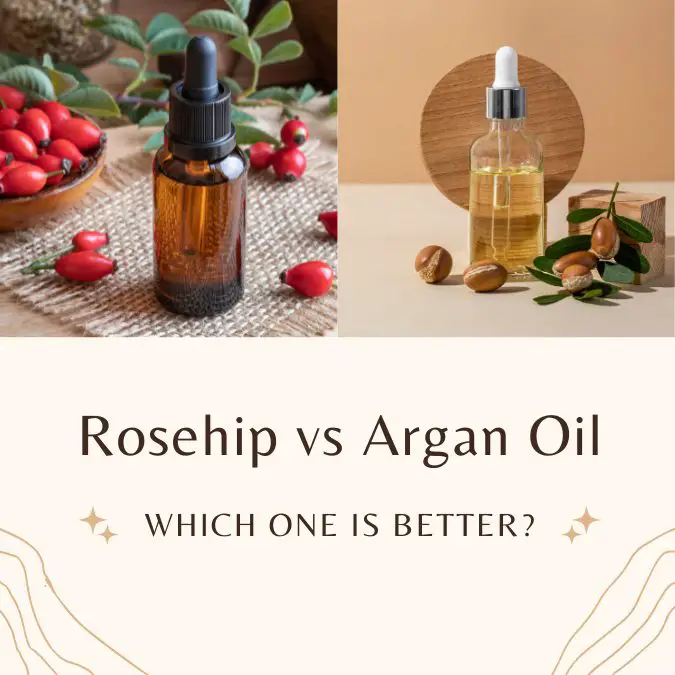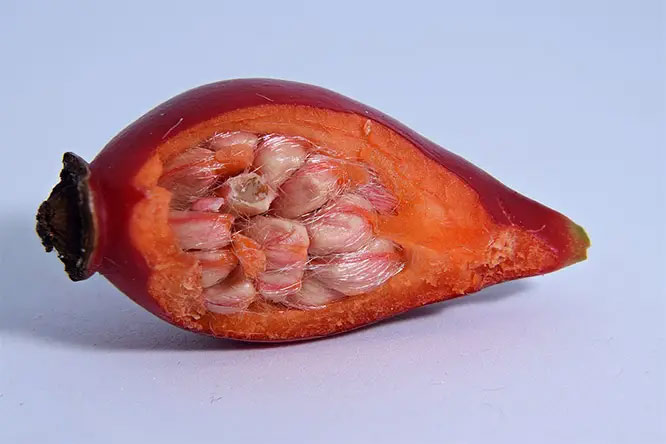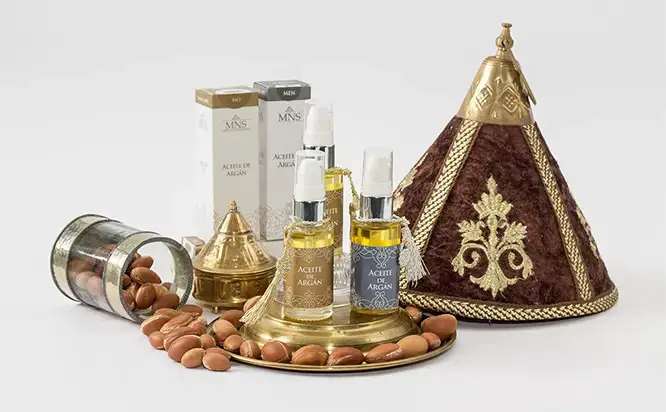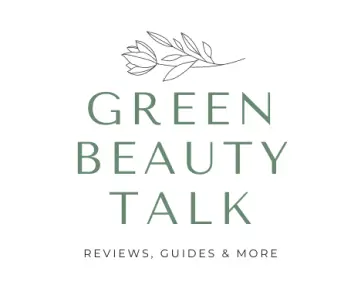
Rosehip oil and Argan oil seem to be buzzwords these days, with adverts regularly touting them as wonder ingredients in all types of products from anti-ageing moisturisers to fortifying hair shampoos.
But what is all the hype about? And are these oils only helpful for maturing skin or do they have other uses? With both oils carrying numerous benefits, this article sets out to discuss the facts on Rosehip oil vs Argan oil…
Table of Contents
- What is Rosehip Oil?
- What is Argan Oil?
- Nutritional Profiles: A Detailed Look
- Benefits Compared: Rosehip vs. Argan Oil
- The Anti-Ageing Properties of Both Oils
- Which is Better for Acne: Rosehip or Argan oil?
- Which Oil is More Suited For Oily Skin?
- Is Rosehip or Argan Oil Better for Stretch Marks?
- Rosehip vs. Argan Oil for Dry Skin: Which to Choose?
- Can You Use Argan and Rosehip Oil Together?
- Conclusion – Which is Better?
What is Rosehip Oil?
Rosehip oil is made from the seeds of wild rose bushes that grow in the Southern Andes Mountains, known as the Rosa Moschata or the Rosa Rubiginosa.
Rosehip oil can also be made from the Rosa Canina variety which is found growing predominantly in South Africa and in parts of Europe. It is made by extracting the oil from the plant’s seeds.

Note: Some Rosehip oil is made using the oil from both the seeds and fruits of the tree, however, the inclusion of the fruit within the production process results in a lower quality oil with a differing antioxidant profile that some manufacturers may still label as “Rosehip Oil”. Be sure to always check the label before you buy.
What is Argan Oil?
Argan oil has both cosmetic and food-based uses with an excellent fatty acid composition made from the kernels harvested from the Argan tree (Argania Spinosa) found growing chiefly in Morocco. This highly valuable oil contains a range of antioxidants, vitamins, minerals and both monounsaturated and polyunsaturated fatty acids.
Nutritional Profiles: A Detailed Look
Rosehip oil and Argan oil have amazing benefits, the latter being both nutritionally and cosmetically beneficial, while the former has cosmetic benefits and can’t safely be ingested. However, the Rosehip fruits can be made into a delicious tea providing some excellent levels of vitamin C.
Argan oil, on the other hand, can be consumed in a variety of ways, such as drizzled on salads or added to smoothies, in moderation.
Topical usage is certainly the most popular use for both of these oils, and both have an excellent reputation as key ingredients in anti-ageing preparations. This is just one aspect of their benefits though! I’ll go into further detail about these later in the article, but for now, let’s take a look at the nutritional profile of each of these oils:
Argan Oil:
As mentioned above, Argan oil contains both monounsaturated and polyunsaturated fatty acids, with oleic acid and linoleic acid making up 43% and 36% respectively. These two fatty acids are essential in our diets, hence having the name, “essential fatty acids” (EFAs).
Argan oil does contain some saturated fatty acids too, but in a significantly lower quantity than the other fats (20%). It is high in free-radical scavenging vitamin E and this is one of the main reasons it’s such an exceptional product in skincare regimes. Other antioxidants found in Argan oil include carotenes, phenols, co-enzyme Q10 and melatonin.

Rosehip Oil:
As noted briefly above, the type of Rosehip oil which is most beneficial and is made from the valuable seeds rather than from the fruit (or made using a combination of both seeds and fruit), is the Rosehip Seed Oil. Some Rosehip oils are not labelled as explicitly as this and may simply be called “Rosehip Oil”, so be sure to double-check the label.
Rosehip oil contains a range of nutrients including essential fatty acids, vitamin A (in its natural retinol form) and vitamin E. Depending on the specific Rosehip oil you purchase, some may also contain small concentrations of vitamin C. Where a Rosehip oil contains higher levels of vitamin C or claims to contain it within its advertising or on its packaging, it will almost always be Rosehip oil made predominantly from the rosehip fruits of the plant.
As you can see, there are similarities between these two oils with the main ones being that they both contain high concentrations of EFAs as well as high levels of antioxidant vitamin E.
Benefits Compared: Rosehip vs. Argan Oil
The benefits of both Rosehip oil and Argan oil are numerous, however, each one has its specific uses while also having some similar uses.
Rosehip Oil Benefits:
- Skin regeneration. Due to its high concentration of essential fatty acids, this oil works to help increase the skin’s elasticity and preserve oil and water moisture balance. This is able to happen because the fatty acids help to create a type of barrier on the skin which prevents the loss of water and beneficial oils through the skin’s surface.
- Skin smoothing and acne treatment. Retinol, the naturally occurring form of vitamin A, works wonders on lines and wrinkles that are formed as one matures. Vitamin A is also used in skin preparations to help treat acne, with natural sources being far better for us than their synthetic counterparts.
- Anti-inflammatory. Vitamin E has anti-inflammatory properties and as this is found in high concentrations within Rosehip oil, we can see why this oil might have benefits for anyone suffering from skin conditions linked to inflammation such as psoriasis, eczema, unclassified rashes and other forms of dermatitis.
Argan Oil Benefits:
Argan oil goes beyond being a delicious dietary choice; it’s incredibly beneficial for your skin and hair. Although it has dietary benefits like anti-cancer properties and the ability to help regulate blood sugar levels, its true value shines through in its cosmetic uses. Let’s explore why Argan oil is such a favourite for beauty care:
- Hair Health: Argan oil can transform your hair, bringing vitality back to damaged or lifeless locks. With regular use, it repairs and strengthens hair, encourages growth, and adds a lustrous shine. It’s particularly helpful for hair that’s dry or has suffered from too much styling or chemical treatments.
- Nail Care: If you’re dealing with brittle or weak nails, Argan oil is a simple yet effective solution. Massaging a small amount into your nails and cuticles each night can fortify and enhance their appearance, leading to stronger, healthier nails.
- Acne Solution: For those battling acne, Argan oil can be a gentle yet powerful ally. Its anti-inflammatory properties and ability to regulate sebum production can help reduce acne breakouts, minimize redness, and promote clearer skin.
- Anti-Aging: Loaded with vitamin E, Argan oil offers significant anti-aging benefits. It helps fend off free radical damage, moisturizes the skin, and smooths out fine lines and wrinkles, giving your skin a firmer, more youthful look.
The Anti-Ageing Properties of Both Oils
Both Rosehip oil and Argan oil are found in anti-ageing skincare preparations, but even used “neat” and directly on the skin, they are both safe and will provide their beneficial properties in higher concentrations.
Argan oil is highest in oleic acid (a monounsaturated omega-9 fatty acid), while Rosehip oil is highest in linoleic acid (a polyunsaturated omega-6 fatty acid).

Oleic acid, thanks to its ability to penetrate the skin’s top layers with ease, boosts the anti-ageing properties of Argan oil, and may also help to improve memory which can very often decline with age.
In studies, Argan oil has been shown to have an effect on the skin’s elasticity, increasing its resilience and helping to restore the skin’s natural barrier function which so many of us have experienced a decline in thanks to the wind, rain, excessive sun exposure and poor skincare regimes to name but a few. With the skin’s barrier repaired, its capacity to hold water molecules is improved and therefore the skin feels moisturised and appears plumper.
Linoleic acid has the beneficial properties of boosting cellular activity, stimulating cell regeneration and acting as an anti-inflammatory. (You may be aware that the ageing process is sped up by inflammatory processes within the body).
Because of Rosehip oil‘s antioxidant properties, it is a significant source of phytonutrients and various studies have demonstrated the anti-ageing capabilities of these compounds.
Of the two oils, Argan oil is the one that is more easily absorbed by the skin, and because of its vitamin E content being higher than that of Rosehip oil, the antioxidant properties are slightly higher.
Neither of the oils has been shown to have skin-lifting properties but they certainly have been shown to have an effect on minimising the appearance of lines and wrinkles.
Which is Better for Acne: Rosehip or Argan oil?
When choosing between Rosehip and Argan oil for acne-prone skin, it’s essential to focus on what’s most helpful for acne. A study in the Cosmetic Dermatology journal reveals that people with acne often lack enough essential fatty acids (EFAs), like gamma-linoleic acid, on their skin. This shortage can make acne worse and lead to more clogged pores.
The good news is that applying oils rich in omega-3 and omega-6 EFAs directly to the skin can significantly help improve acne without causing more breakouts. Both Rosehip and Argan oils are great sources of these beneficial EFAs.
Argan Oil: With a mix of omega-6 and omega-9 fatty acids, Argan oil is good at calming inflammation and regulating oil production. Its low chance of clogging pores (low comedogenic rating) makes it a safer option for those worried about acne.
Rosehip Oil: Rich in omega-6 fatty acids, Rosehip oil can also reduce inflammation and help with skin repair. However, it might increase oil production in some people, so it’s a bit of a gamble for those with very oily skin.
In Short: Considering their benefits, Argan oil might be a slightly better choice for acne-prone skin due to its ability to balance oil without clogging pores. However, everyone’s skin is different, so it’s smart to try a small amount first to see how your skin reacts.
Which Oil is More Suited For Oily Skin?
For those with oily skin, Rosehip oil often stands out as the best option. This is because oily skin typically has lower levels of linoleic acid in its sebum. Rich in linoleic acid, Rosehip oil helps to rebalance your skin’s natural oils, reducing both oiliness and the risk of acne. While Argan oil also offers benefits, Rosehip oil more directly tackles the specific issue of linoleic acid deficiency in oily skin types.
Is Rosehip or Argan Oil Better for Stretch Marks?
Stretch marks are small tears in the skin which look like uneven stripes along the skin. Their medical name is striae gravidarum and they tend to occur when the skin is stretched beyond its natural capacity, hence the name, “stretch marks”.
Argan oil has been shown to improve the skin’s elasticity, which can help to prevent stretch marks if used regularly prior to the marks appearing. Meanwhile, the natural vitamin A found in Rosehip oil – not retinol, but related compounds like beta-carotene and all-trans retinoic acid – has been shown to have a positive effect on newly formed stretch marks.
It is important to note that the application of either of the oils should be started before any marks even begin to show because prevention is easier and more achievable than cure.
This is especially relevant for pregnant women – start using your chosen oil as soon as you find out you’re expecting! In the case of the red or pink coloured stretch marks, medically known as striae distensae or striae rubria, these early-stage marks will most likely see an improvement by using either of the oils regularly.
Once the stretch marks have become white or silver in colour, there are very few known or researched treatments that will repair these.
Rosehip vs. Argan Oil for Dry Skin: Which to Choose?
Both Rosehip and Argan oils are great for dry skin. Argan oil is a bit lighter and might not feel as oily. Some people think Rosehip oil feels less greasy, though.
Try them both to see what you like. Put a little Argan oil on one part of your skin and Rosehip on another. See which one makes your skin feel better without being too greasy.
They’re both good at keeping your skin soft and hydrated. Your choice depends on what feels best on your skin and what kind of texture you prefer.
Can You Use Argan and Rosehip Oil Together?
This is a common question with a simple answer: yes! Combining Rosehip oil and Argan oil and using it as a topical moisturiser combines the benefits of both types of oils and provides a nicely balanced ratio of oleic and linoleic fatty acids. With the vitamin E from both oils alongside the vitamin A from the Rosehip oil, you’ll be left with a great oil perfect for covering all skincare bases.
Conclusion – Which is Better?
In conclusion, it is clear that both Rosehip oil and Argan oil are highly beneficial for the skin, with Argan oil also being beneficial when consumed as part of the diet. So, which is better? There is no set answer to this question – it will depend on the intended use of the oil. But, to recap the above in a nutshell, for anti-ageing skincare properties it’s Argan oil, for acne-prone skin it’s Argan oil, for oily skin it’s Rosehip oil and for stretch marks, both Argan oil and Rosehip oil have been shown to be effective on newly formed ones.
What’s great is that with both of these oils having so many similar benefits and uses, these don’t need to be hard and fast rules – rather choose the oil that suits your five senses best!
Sources:
https://www.sciencedirect.com/science/article/pii/S2214008515000073
https://www.ncbi.nlm.nih.gov/pubmed/12548113
https://www.ncbi.nlm.nih.gov/pubmed/23472457
https://www.researchgate.net/publication/283507224_Rose_Hip_Rosa_canina_L_oils
https://www.ncbi.nlm.nih.gov/pmc/articles/PMC5849435/
https://www.healthhub.sg/a-z/diseases-and-conditions/636/inflammatory-skin-conditions
https://www.researchgate.net/publication/239324011_Antidiabetic_Activity_Assessment_of_Argania_spinosa_Oi
https://www.ncbi.nlm.nih.gov/pmc/articles/PMC5796020/
https://www.researchgate.net/publication/263684767_Characterization_of_Rosehip_Rosa_canina_L_Seed_and_Seed_Oil
http://grasasyaceites.revistas.csic.es/index.php/grasasyaceites/article/view/1715/2263#SEC3.3
https://www.ncbi.nlm.nih.gov/pubmed/27623718
https://www.sciencedirect.com/topics/agricultural-and-biological-sciences/oleic-acid
https://www.mayoclinic.org/diseases-conditions/acne/symptoms-causes/syc-20368047
https://www.cambridgelaboratories.ca/other-resources/?pg=13&pgtitle=essential-fatty-acids-and-acne
https://www.medicalnewstoday.com/articles/321595.php
https://www.ncbi.nlm.nih.gov/pmc/articles/PMC5019162/
https://www.ncbi.nlm.nih.gov/pubmed/23237514

Petra Nakashian (previously Kravos) is a dedicated natural health and beauty blogger, driven by the loss of her parents to cancer, which led her to meticulously research beauty product ingredients. With over 10 years of experience, her in-depth knowledge has made her a trusted expert in the field. Founder of Be Healthy Now and Green Beauty Talk, Petra recently expanded her expertise with Beauty Insights Hub, exploring a wider range of beauty treatments. Committed to transparency and honesty, her work is a vital resource for navigating the complex world of beauty.
